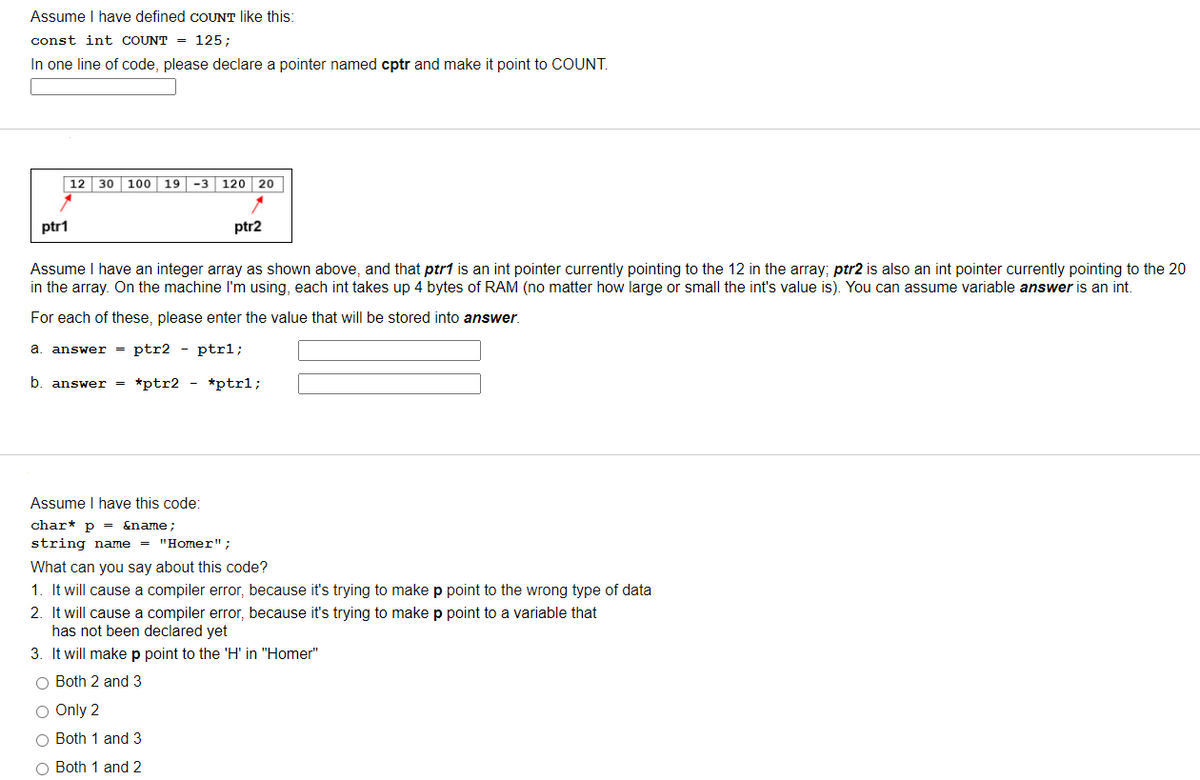Assume I have defined COUNT like this: const int COUNT = 125; In one line of code, please declare a pointer named cptr and make it point to COUNT. 12 30 100 19 -3 120 20 ptr1 ptr2 Assume I have an integer array as shown above, and that ptr1 is an int pointer currently pointing to the 12 in the array; ptr2 is also an int pointer currently pointing to the 20 in the array. On the machine l'm using, each int takes up 4 bytes of RAM (no matter how large or small the int's value is). You can assume variable answer is an int. For each of these, please enter the value that will be stored into answer. a. answer - ptr2 - ptrl; b. answer = *ptr2 - *ptrl; Assume I have this code: char* p - &name; string name = "Homer"; What can you say about this code? 1. It will cause a compiler error, because it's trying to make p point to the wrong type of data 2. It will cause a compiler error, because it's trying to make p point to a variable that has not been declared yet 3. It will make p point to the 'H' in "Homer" O Both 2 and 3 O Only 2 O Both 1 and 3 O Both 1 and 2
Assume I have defined COUNT like this: const int COUNT = 125; In one line of code, please declare a pointer named cptr and make it point to COUNT. 12 30 100 19 -3 120 20 ptr1 ptr2 Assume I have an integer array as shown above, and that ptr1 is an int pointer currently pointing to the 12 in the array; ptr2 is also an int pointer currently pointing to the 20 in the array. On the machine l'm using, each int takes up 4 bytes of RAM (no matter how large or small the int's value is). You can assume variable answer is an int. For each of these, please enter the value that will be stored into answer. a. answer - ptr2 - ptrl; b. answer = *ptr2 - *ptrl; Assume I have this code: char* p - &name; string name = "Homer"; What can you say about this code? 1. It will cause a compiler error, because it's trying to make p point to the wrong type of data 2. It will cause a compiler error, because it's trying to make p point to a variable that has not been declared yet 3. It will make p point to the 'H' in "Homer" O Both 2 and 3 O Only 2 O Both 1 and 3 O Both 1 and 2
C++ for Engineers and Scientists
4th Edition
ISBN:9781133187844
Author:Bronson, Gary J.
Publisher:Bronson, Gary J.
Chapter10: Pointers
Section: Chapter Questions
Problem 4PP
Related questions
Question

Transcribed Image Text:Assume I have defined COUNT like this:
const int COUNT = 125;
In one line of code, please declare a pointer named cptr and make it point to COUNT.
12 30
100
19
-3
120 20
ptr1
ptr2
Assume I have an integer array as shown above, and that ptr1 is an int pointer currently pointing to the 12 in the array; ptr2 is also an int pointer currently pointing to the 20
in the array. On the machine I'm using, each int takes up 4 bytes of RAM (no matter how large or small the int's value is). You can assume variable answer is an int.
For each of these, please enter the value that will be stored into answer.
a. answer = ptr2 - ptrl;
b.
answer = *ptr2 - *ptrl;
Assume I have this code:
char* p = &name;
string name - "Homer";
What can you say about this code?
1. It will cause a compiler error, because it's trying to make p point to the wrong type of data
2. It will cause a compiler error, because it's trying to make p point to a variable that
has not been declared yet
3. It will make p point to the 'H' in "Homer"
O Both 2 and 3
O Only 2
O Both 1 and 3
O Both 1 and 2
Expert Solution
This question has been solved!
Explore an expertly crafted, step-by-step solution for a thorough understanding of key concepts.
This is a popular solution!
Trending now
This is a popular solution!
Step by step
Solved in 2 steps

Knowledge Booster
Learn more about
Need a deep-dive on the concept behind this application? Look no further. Learn more about this topic, computer-science and related others by exploring similar questions and additional content below.Recommended textbooks for you

C++ for Engineers and Scientists
Computer Science
ISBN:
9781133187844
Author:
Bronson, Gary J.
Publisher:
Course Technology Ptr

C++ for Engineers and Scientists
Computer Science
ISBN:
9781133187844
Author:
Bronson, Gary J.
Publisher:
Course Technology Ptr